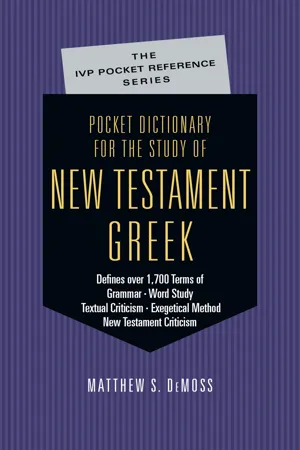A
a fortiori. Lat. “from a stronger [reason or argument].” The term is similar to the expression “all the more” and refers to a conclusion that can be drawn with greater logical necessity than a previous one. See also qal wahomer.
ablative. adj. Denoting separation or the idea of movement away from something. —n. An ablative word; or one of the *cases in the *eightcase system (Lat. ablativus, “pertaining to removal from”).
ablaut. n. Alteration of the vowels of words indicating a change of *case, *tense, etc., as in swim, swam, swum. Also called apophony or vowel gradation. Ablaut pertains to the *synchronic shifting or “grading” of vowels, but the term is also used to speak of *diachronic gradation (also called *vowel shift), which pertains to the evolution of language over time.
absolute. adj. Of words and clauses, standing apart grammatically from the other elements in a sentence (Lat. absolutum, “free from, separate”).
absolute object. See cognate accusative.
absolute tense. n. The indication of *time using *tense forms.
absolute time. n. The signification of *time related directly to the speaker/writer’s time frame, as opposed to *relative time, in which the temporal relationship is dependent on the time of the *main verb. That is, relative time means the time of the verbal action is dependent on or relative to another part of speech. Traditionally time has been thought of, generally speaking, as *absolute in the indicative mood but relative or unstated outside the indicative. See also absolute tense.
abstract noun. n. A *substantive that signifies a concept, quantity, quality or state (among other things), as in hatred and sportsmanship. It is the opposite of a *concrete noun, which refers to something tangible or real (wall, ocean, etc.).
accent. n. The stress placed on a syllable, or the symbol (*diacritical mark) standing above a vowel to denote that it is an emphasized syllable. In classical Greek, words were accented by a modulation of pitch, but gradually this was replaced by simply giving accented syllables greater vocal prominence (i.e., stress). The written accents were apparently introduced by grammarians who, during the growing influence of Koine Greek, wished to preserve the language as it had once been spoken. The New Testament *autographa did not contain accents; the accents were added later. Today students are usually taught to treat all three accents—*acute, *grave and *circumflex—alike, giving accented syllables slightly more stress.
accentuation. n. The accenting of words or the accenting system of a language. See accent.
accidence. n. The study of word formation, including changes in words due to *inflection.
accretion. n. In textual criticism, material that was added to the biblical text (Lat. accrescere, “to grow”). The term can be used broadly to refer to any scribal change—amendments, alterations, *glosses, corrections and *harmonizations—whether intentional or accidental.
accusative. adj. or n. The *case that usually marks a noun, pronoun or other substantive as the *object of the verbal action, i.e., functioning as the *direct object.
accusative of content. See cognate accusative.
accusative of extent. n. An accusative case substantive that delimits the extent of the verbal action in terms of how far or how long. E.g., άπεσπάσθη άπ αύτῶν ὡσεì λίθου βολήν (“he withdrew from them about a stone’s throw,” Lk 22:41); also Acts 20:16; John 2:12.
accusative of extent of space. See accusative of extent.
accusative of extent of time. See accusative of extent.
accusative of general reference. n. The subject of the *infinitive, which appears in the accusative. E.g., ποιήσατε τοὺς άνθρώπους άναπεσεῖν (“Make the people sit down,” Jn 6:10); also Acts 7:19; 11:15; 1 Thessalonians 5:27. This term may also be used to refer to the *accusative of respect.
accusative of manner. See adverbial accusative.
accusative of measure. See accusative of extent.
accusative of reference. See accusative of respect.
accusative of respect. n. An accusative case substantive that indicates what the verbal action is referring to. E.g., τοὔνομα (“with respect to name,” Mt 27:57); also Romans 10:5; Ephesians 4:15; Revelation 1:20.
accusative of retained object. n. An accusative case substantive that in an *object complement construction with an *active verb retains its case when the verb is *passive. See Luke 7:29; 1 Corinthians 12:13.
accusativum pendens. Lat. “hanging accusative.” See pendent accusative.
active. adj. or n. The *voice that signifies that the *subject is performing or causing the verbal action.
acute accent. n. An *accent that appears as a forward slanting mark above vowels (ά) and was originally used to signify a rise in pitch (Lat. “sharp”).
ad sensum. See constructio ad sensum.
adiaphora. n. In theology and ethics, matters not essential to the Christian faith.
adjectival. adj. Functioning in some way like an *adjective.
adjective. n. A word that modifies or qualifies a *substantive or describes a state or quality.
adjective genitive. See descriptive genitive.
adjunct. n. A *modifying word or phrase that functions in an auxiliary capacity; it can be omitted without rendering the sentence *ungrammatical.
adjunctive. adj. Denoting an addition with the sense of “also.” The adjunctive use of καί carries this meaning, in which it functions as an *adverb.
adnominal. adj. Of words and phrases, modifying a *noun. —n. A word or phrase that modifies a noun.
adverb. n. A word that modifies a verb, adjective or another adverb (Lat. “toward the verb”).
adverbial. adj. Functioning in some way like an *adverb. The term is used to describe *infinitives, *participles, *prepositional phrases or *clauses generally whose function is to *modify a *verb or make an assertion related to the *main...
